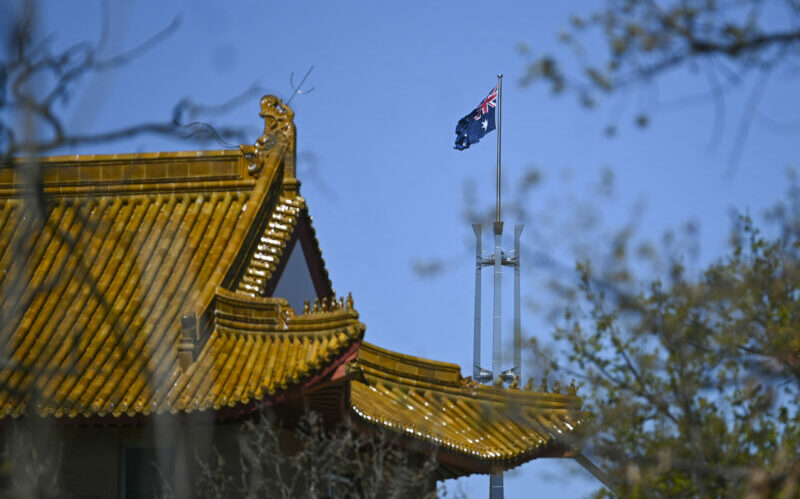China-Australia relations: A way out of the freeze?
November 25, 2021
Chinas stated wish to join the Comprehensive and Progressive Agreement on Trans-Pacific Partnership (CPTPP) could, if we are skilful, give us a path to promote the restoration of more normal diplomatic relations.
The recent Biden-Xi discussion is generally agreed to have led to a reduction of tension between the two competing great powers, including over the fraught issue of Taiwan. Another concurrent development has been an easing of bilateral relations between the two, including in the economic area, and in areas affecting Australia.
Examples include the fact that American firms have picked up market share in China in regard to a number of commodities formerly supplied by Australia but recently banned or severely restricted by decisions of the Chinese authorities. The US special trade representative and at least one other very senior official have been reported as talking up the importance of US-China economic links, and the prospects for increasing trade volumes. Chinese and American officials held economic discussions earlier this week US and Chinese firms have signed a $4 billion deal for the supply of LNG. And the Chinese air transport authority has announced that it expects to clear the troubled Boeing 727 MAX aircraft for domestic flights in China a huge and most important aircraft market.
Its interesting to look back on remarks by Chinese Foreign Minister Wang Yi earlier in the year when he told various American interlocutors that the US could not expect China to cooperate on climate change when that would be the only oasis of cooperation while otherwise the US attitude to China was barren and even hostile. Well, as we know, the US and China reached an agreement on climate in Geneva and, as the preceding paragraphs show, the climate between them has become less barren and hostile (though well need to watch for Chinas reaction to Joe Biden inviting Taiwan to his democracy summit).
Where does that leave us?
Not in a very enviable place since, as commentators have pointed out, we are unique in having had our ministerial-level relations with China placed in a deep freeze, despite many other countries, which maintain normal diplomatic relations with China, also having issues or even disputes with it. Its obviously undesirable for us to be in this state of affairs with our largest trading partner. Although many Australian firms affected by Chinas boycotts have been very resourceful in finding alternative markets for their exports, overall the economic damage has not been inconsiderable. Neither does it help our regional diplomacy to have been sent to Coventry by the regions major power.
How did we get into this situation?
Many factors contributed, of course including Chinas actions and attitudes. On our side successive governments appear to have undervalued the economic (and more general) relationship built up in a bi-partisan way on the Australian side over many decades, to have placed too much credence in the permanence of US attitudes, and to have wrongly believed that taking the lead in campaigns against China on important issues such as Huawei and the origins of Covid would be a free kick, with no response from China.
But there was a response, and the question now is how to move forward from the resulting stagnant state of affairs. It isnt easy since, according to various intimations by its officials, China, reverting to its Middle Kingdom syndrome, expects us to make the first (and conciliatory) move, while we dont regard ourselves as having any reason to admit error.
Fortunately a possible channel has appeared. That is Chinas stated interest in joining the Comprehensive and Progressive Agreement for a Trans-Pacific partnership, the TPP.
The TPP is the high quality trade agreement promoted for years by the US, but which Donald Trump decided the US did not after all want to be part of, a decision which Biden has not yet shown a wish to reverse. Nonetheless the TPP did not die, largely due to the efforts of Australia and Japan, and is now something that both China and Taiwan not to say Great Britain want to join. Admission of a new member must be by the unanimous agreement of existing members. What should our response be?
So far two lines of response have been aired publicly. At the most senior level, Prime Minister Scott Morrison was reported in The Australian as saying: The CPTPP sets a very high benchmark that you have to be able to achieve and it is important that those who are seeking to become parts of an arrangement like that wouldnt want to have a track record of coercing other trade partners.
He is of course correct, but a flat and quick rejection from Australia is not the only way the issue can be approached.
Indeed another approach was hinted at some time before the PMs remarks by Trade Minister Dan Tehan, who noted the restrictions placed by China on trade with us, and went on to say that acceptance of China into the TPP would from our part require these matters to be resolved, which in turn would require detailed consultations at the ministerial level. Of course he too was quite right, and the subject matter of such consultations would also need to cover aspects of Chinas economy and practices beyond its bilateral trade with us.
But the recent conduct by China of its trade relations with us is clearly a very relevant issue by itself.
A response to Chinas declared interest to the effect that we would welcome Chinas adherence to the partnership, and its provisions, but that that would clearly require substantive talks at an appropriately senior, ministerial, level, could possibly be the way to unfreeze the present situation. It has been a situation which has caused economic harm to some of our important industries, is to say the least annoying to us, and doesnt do China any good either in terms of its global reputation, so the sooner we can get past it the better.

